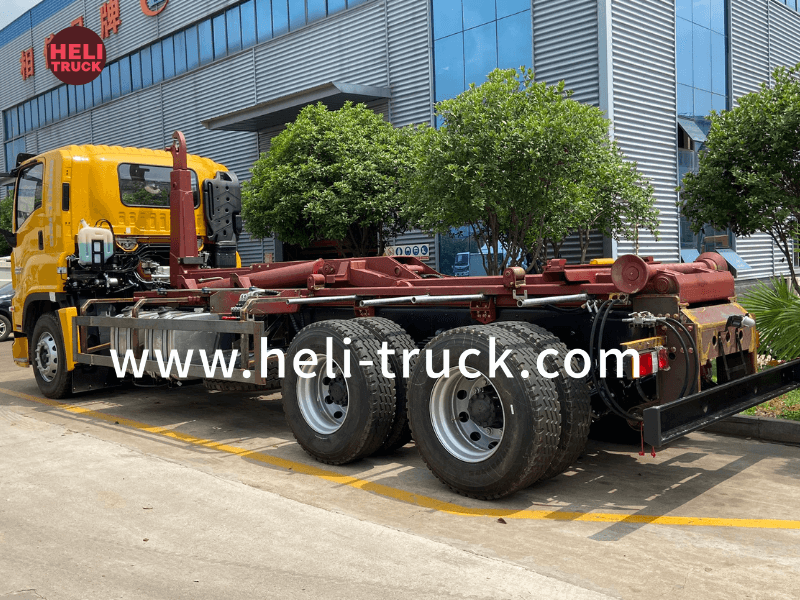Introduction

Garbage compactor trucks play a crucial role in the efficient management of waste in urban areas. These specialized vehicles are equipped with powerful engines that enable them to collect, compact, and transport garbage from residential and commercial areas to disposal sites. In this article, we will delve into the intricacies of garbage compactor truck engines, exploring their design, functionality, maintenance, and the latest advancements in engine technology.
1. Overview of Garbage Compactor Trucks
Garbage compactor trucks, also known as refuse trucks or trash compactors, are essential in maintaining cleanliness and hygiene in urban environments. These trucks come in various sizes and configurations, ranging from small rear-loading trucks to large front-loading or side-loading compactor trucks used for commercial waste collection. The primary function of a garbage compactor truck is to collect solid waste, compact it to reduce volume, and transport it to designated disposal sites such as landfills or recycling centers.
2. Importance of Engine Performance
The engine is the heart of a garbage compactor truck, providing the power necessary to operate the hydraulic systems that control the compaction process. https://www.heli-truck.com/water-tank-truck/ is crucial for the efficiency and productivity of the vehicle, as it determines factors such as speed, torque, and fuel consumption. A reliable and robust engine is essential for ensuring that the garbage compactor truck can handle heavy loads and challenging operating conditions.
3. Types of Engines Used in Garbage Compactor Trucks
Garbage compactor trucks are typically equipped with diesel engines due to their durability, fuel efficiency, and high torque output. Diesel engines are well-suited for the demanding nature of waste collection and compaction operations, providing the necessary power to operate the hydraulic systems and move heavy loads. Some garbage compactor trucks may also be powered by compressed natural gas (CNG) engines, which offer environmental benefits in terms of reduced emissions.
4. Design and Functionality of Garbage Compactor Truck Engines
Garbage compactor truck engines are specifically designed to meet the unique requirements of waste collection and compaction operations. These engines are equipped with features such as high torque output, robust construction, and efficient cooling systems to withstand the rigors of continuous operation. The engine is connected to the hydraulic system of the compactor, which controls the movement of the compaction blade and the operation of the loading hopper.
5. Maintenance and Care of Garbage Compactor Truck Engines
Proper maintenance is essential to ensure the longevity and performance of a garbage compactor truck engine. Regular servicing, oil changes, and inspections are crucial to prevent breakdowns and downtime. Engine components such as filters, belts, and hoses should be checked and replaced as needed to maintain optimal performance. Additionally, operators should follow recommended maintenance schedules and practices to keep the engine in top condition.
6. Advancements in Engine Technology for Garbage Compactor Trucks
In recent years, advancements in engine technology have led to improvements in the performance, efficiency, and environmental impact of garbage compactor trucks. Manufacturers are developing engines that are more fuel-efficient, produce lower emissions, and require less maintenance. Hybrid and electric engines are also being explored as sustainable alternatives for powering garbage compactor trucks, reducing reliance on fossil fuels and minimizing carbon footprint.
7. Challenges and Future Trends
Despite the progress in engine technology, garbage compactor trucks continue to face challenges such as increasing fuel costs, stricter emissions regulations, and the need for more sustainable waste management practices. In response, manufacturers are focusing on developing engines that are cleaner, quieter, and more efficient. The integration of telematics and IoT technology is also expected to improve fleet management and optimize route planning for garbage collection operations.
Conclusion
Garbage compactor truck engines are essential components that power the operations of waste collection and compaction vehicles. The efficiency, reliability, and performance of the engine directly impact the productivity and cost-effectiveness of garbage collection services. As technology continues to advance, we can expect to see further improvements in engine design, fuel efficiency, and sustainability in garbage compactor trucks, ensuring cleaner and more efficient waste management in urban areas.
